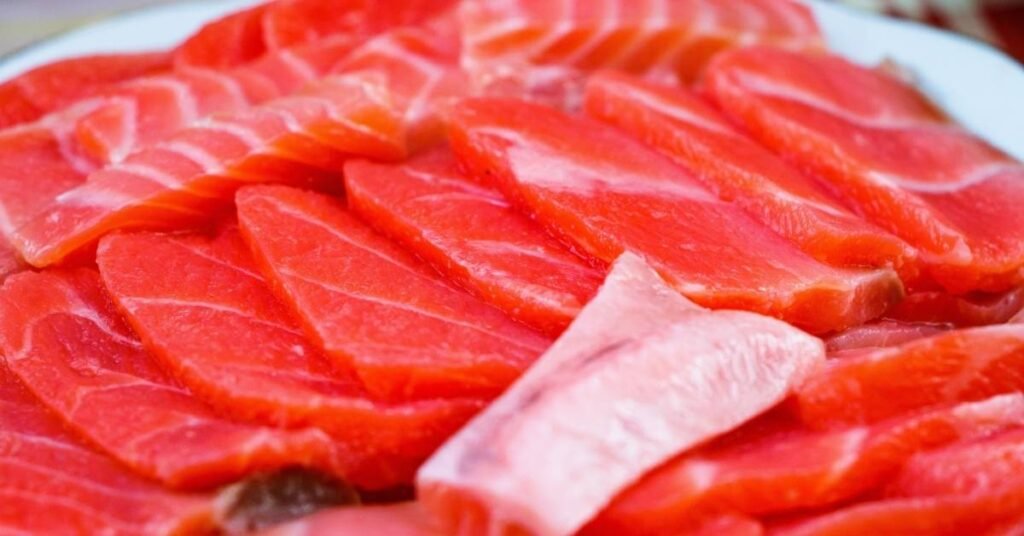If you ask five people if fish counts as meat, and you’ll probably get five different answers. When it comes to considering fish as “meat,” there are many different opinions. In many cases, fish is considered meat. If fish meat is thinking about the muscle tissue of an animal, then yes, fish can think about meat.
Fish is also rich in vitamins D and B, omega-3 fatty acids, and minerals. Eating fish at least twice a week can help prevent heart disease. It is also a rich source of minerals like magnesium, potassium, phosphorus, iodine, iron, and zinc.
In today’s blog post, I will discuss with you in detail whether fish can be considered meat.
Table of Contents
Fish as Food
Fish is a better food than some other foods. There are many species of fish in the world, except for a few species of fish, all species of fish can be eaten. In almost all countries in the world, regular fish are caught by humans and consumed as food. As a dietary source, protein, along with other nutrients, is abundantly available in fish
Fish meat is just as tasty as meat from other animals (birds, cows, goats, ducks, chickens, pigs). Also, fish is not only eaten for its taste. It is eaten for its unique nutritional value. If you cook fish skillfully, fish will beat all other meats.

According to a 1961 study, the United States, Japan, and Europe accounted for 47 per cent of the world’s diet. However, as of 2015, only 20 hundred fish were eaten. Compared to all other countries, Asian countries lead in fish production and play an increasing role in the diet.
In this article, we will explore the health issues of fish and discuss various aspects.
People of Different Religions View
If we consider fish as “meat”, depending on religious views and dietary habits, then different opinions emerge.
Fish is not specifically mentioned as meat in Islam. Islamic dietary law typically appraises fish as a halal or permissible food. The Quran mentions forbidding certain meats but does not classify fish separately.
Fish is highly regarded in Jewish dietary law. Fish with scales and fins are classified as “parve, ” an impartial category separate from meat and dairy products.
In Christianity, especially Catholicism, fish is not traditionally considered as meat, especially during Lent. This is a long time when they are allowed to eat fish, but meat is restricted. Friday is connected to the crucifixion of Christ, and self-restraint from beef is seen as a form of penance. However, they do not abstain from eating fish. They catch fish as a simpler, more humble food than the flesh of land animals.
From a biological outlook, fish is an animal’s meat. However, culinary and nutritional differences often differentiate fish from other meats due to its nutritional benefits and preparation methods. Again, in many cultures, especially in Southeast Asia, fish is considered meat.
Which River Fish vs Sea Fish Tastes Better?
Whether river fish or sea fish tastes better depends on personal taste preferences. Both types of fish taste slightly different in different waters.
River Fish
River Fish have a milder taste and lack the salty taste of saltwater fish. They contain high levels of calcium and monounsaturated and polyunsaturated fatty acids, which help in bone formation. River Fish are often considered to have a less “fishy” taste. These fish are generally preferred by those who prefer a cleaner, more neutral taste.
Example: Fish like perch and trout are popular for their mild flavor. River Fish have smaller, more complex bones that require more care when cooking. It is used in light dishes to preserve the delicate flavor of River Fish.
Finally, some people prefer the mild taste of freshwater fish, while others enjoy the bright flavor of saltwater fish. Furthermore, factors influence the taste of individual fish species.
Sea Fish
Sea Fish are generally considered to be salty. They also have a slightly salty taste, which is due to the natural salt in the seawater environment. Sea Fish are generally high in omega-3 fatty acids, which are beneficial for heart health.
The marine environment imparts a tangy flavor that makes it a favorite among those who enjoy spicy seafood. Example: Fish like salmon, mackerel, and tuna are favored by seafood lovers for their intense flavor.
Sea fish bones are usually larger, making them easier to break. Sea fish are often grilled or baked to enhance their natural flavor.
Is fish skin Healthy?
Fish skin provides various nutritional benefits:
Fish skin contains a lot of vitamins D, E, A, and B12, as well as minerals like selenium, phosphorus, calcium, and iodine. Fish skin is rich in omega-3 fatty acids. Omega-3 fatty acids are beneficial for heart health, reducing inflammation, and skin health. Fish skin is an excellent source of protein, which is essential for muscle growth and repair.

Fish skin contains collagen and vitamin E. This helps increase skin moisture and reduce signs of ageing. Salmon skin, in particular, has strong antioxidant properties. Antioxidants help in wound healing.
Is Fish Healthier than Meat
Comparing fish and meat to determine which is healthier is not easy. The healthiness of the two depends on the cooking style and the type of fish and meat. However, some marine fish are considered healthier than meat.

Below are some points.
Nutritional Profile: The nutritional composition of fish and meat is different. A lot has been discussed about fish guts above. Yet a normal fish contains protons, vitamins, omega fatty acids, and minerals. However, the nutritional value varies depending on the type of meat. Nutrients such as protein, iron, and zinc are also found in meat.
Fat lave: Fish is lower in fat and saturated fat than meat. As a result, fish helps decrease the risk of heart disease. Beef and pork are also high in fat. They raise cholesterol levels and the risk of heart disease.
Nutrient Density: Fish provides essential nutrients, including vitamins A and D, selenium, and iodine. They are important for our overall health.
Protein Quality and Bioavailability: Fish protein is often more bioavailable than protein from land animals, meaning the body can more easily absorb it.
Health Benefits of Eating Fish
The nutrients and health benefits of fish are:
- vitamins
- Omega-3 fatty acids
- protein
- Minerals
- Heart health
- Eye and bone health
Vitamin: Vitamins A, D, B, and E are found in fish. It helps in the usual growth and nutrition of the body and expands immunity. Many diseases occur due to a lack of vitamins in the human body.
Omega-3 Fatty acids: Fish is rich in omega-3 fatty acids. Due to the appearance of these fatty acids, especially DHS (docosahexaenoic acid) and EPA (eicosapentaenoic acid), which reduce essential fats and enhance heart health. Omega-3 plays a central role in brain health.
Protein: Protein in fish contains amino acids. It helps in muscle growth and muscle maintenance.
Mineral: In fish, there are a lot of minerals. Like carbohydrates, proteins, vitamins, and fats in the daily diet, minerals and other nutrients are needed. Minerals keep teeth and bones strong and play a vital role in the nervous system of the brain. The need for this mineral can be met by eating fish.
Heart health: Eating fish regularly or twice a week reduces the risk of cardiovascular complications such as heart attack, stroke and high blood pressure. [Omega-3 fatty acids found in fish help maintain healthy blood pressure]
Eye and bone health: Fish is rich in vitamins and omega-3 fatty acid nutrients that help improve vision. Also, eating fish regularly reduces the risk of macular degeneration (AMD), which protects against dry eye syndrome. In addition, eating fish eyes plays an important role in improving the human heart and brain. There are also some fish like salmon, canned tuna, and sardines that help increase bone strength and density. They are full of calcium and vitamin D that help maintain phosphorus levels, thereby reducing the risk of osteoporosis and fractures.
Nutritional Value: Here is a list of the nutritional value of each 100 grams of cooked fish.
| Nutrition | Amount per 100g |
| Vitamin D | 10-20 IU |
| Vitamin B12 | 2-3mcg |
| Vitamin B16 | 0.2-0.5mg |
| Niacin (Vitamin B3) | 4-8mg |
| Riboflavin (Vitamin B2) | 0.1-0.2 mg |
| Vitamin A | 50-100 IU |
| Omega-3 Fatty acid | 1-2 grams |
| Protein | 20-25 grams |
| Calories | 150 Kcal |
| Total Fat | 5-10 grams |
| Saturated Fat | 1-2 grams |
| Cholesterol | 30-50 mg |
| Sodium | 50-100 mg |
| Potassium | 300-400 mg |
| Phosphorus | 200-300 mg |
| Selenium | 30-50 mg |
| Iron | 0.5-1 mg |
| Zinc | 0.5-1 mg |
| Magnesium | 20-30 mg |
| Calcium | 10-20 mg |
| Fiber | 0 grams |
| Calories | 100-120 Kcal |
(Please note that nutritional value depends on the type of fish and cooking.)
Redfish Health Benefits
Red sea fish is very popular and delicious. Like white fish, red fish is used for dieting. It is also attractive and very important for food lovers.
- The high quality of Omega-3 fatty acids reduces the risk of complications such as heart disease and arthritis.
- Vitamin A and Omega-3 fatty acids help to improve eyesight.
- Omega-3 fatty acids found in redfish help in brain development and function.
- Thyridium can support cardiovascular health due to its high antioxidant content.
Redfish Nutrition Facts
After cooking 100 grams of redfish, all the available nutrients are:
- Protein: 19 grams
- Fat: 7 grams
- Carbohydrates: 0 grams
- Cholesterol: 0 grams
- Sodium: Varies depending on the cooking method and seasonings.
White Fish Health Benefits
White fish contains nutrients that are high in protein and full of vitamins and minerals. Examples include tilapia, cod, haddock, and sole. According to experts, white fish plays an important role in weight loss because, compared to other fish, it has a high level of protein. It also supplies energy to the body due to its high level of protein and potentially reduces fat.
White Fish Nutrition Facts
After cooking 100 grams of white fish, all the available nutrients are:
- Calories: Approximately 112-172 kcal.
- Protein: 19-23 grams
- Fat: 1.22-7.51 grams
- Carbohydrates: 0 grams
- Cholesterol: Approximately 119 mg
- Sodium: Varies depending on the cooking method and seasonings.
[Please note that the above list may vary depending on the cooking method and type of fish. Always best to consult a nutritionist for personalized dietary recommendations]
Health Benefits of White Fish or Red Fish
Both white fish and red fish offer numerous health benefits. However, their nutritional and quality standards are different. Below are some common health benefits.
Health Risks
Fish is a healthy source of protein as an alternative [according to PCBS, there are potential health risks associated with certain types of fish due to environmental contaminants]. High mercury fish such as shark, tilefish, king mackerel, swordfish, etc. These fish pose health risks to the elderly, pregnant women and children. In such a situation, experienced Lokra advises eating low-mercury fish. Such as shrimp, salmon and small tuna. Again, studies have shown that consuming excess amounts of sausage and bacon, used as processed meat, increases the risk of heart disease and cancer.
Red Fish (Oily Fish)
Redfish, such as salmon and mackerel, are rich in omega-3 fatty acids. These fatty acids are beneficial for heart health, reduce inflammation, and support brain function. Redfish omega-3s help lower triglycerides, reduce blood clotting, and reduce the risk of heart disease. This fish is also high in vitamins D and B12, selenium, and other essential nutrients.
In short, a balanced diet that includes both types of fish can provide a wide range of nutritional benefits.
White Fish
White fish like cod, haddock, and halibut are low in fat. Being low in fat, white fish is a healthy alternative to red meat. The selenium in white fish acts as an antioxidant, which protects against chronic diseases. This fish provides a good source of vitamins B6 and B12, phosphorus, and selenium. These help fight inflammation, support bone health, and boost immunity. White fish is rich in protein. Protein helps build muscle and control weight in our body.
Is fish Considered Meat to Vegetarians
No, fish is not considered “meat” for vegetarians. Meat is used as animal meat, such as cow, goat, chicken, bird, pig, sheep, etc.; vegetarian people do not like killing animals according to their basic motivation and from the point of view of moral religion. Choose to live a vegetarian lifestyle for environmental or health reasons. On the other hand, fish meat is considered as “meat” because it is muscle tissue like land animals. Different food list variations of vegetarians are highlighted.
- Ovo vegetarians eat eggs but avoid meat
- People on a pescatarian diet eat seafood but avoid meat from land animals. They are again classified as Pescatarians.
- Lacto-vegetarians still eat dairy products but avoid eggs and meat.
- Lacto-ovo neuraminidase is a plant-based food that is good for you but avoids eggs and dairy products.

Final Thoughts
Asian countries lead the way in fish production and its increasing role in the diet. However, different religious views and dietary habits can influence the classification of fish as meat. Again, comparing fish and meat is challenging, as the healthiness of both depends on the cooking method and the type of fish and meat. Some marine fish are considered healthier than meat due to their low fat, protein, and iron content. However, the nutritional value of fish varies depending on the type of meat and cooking method.



